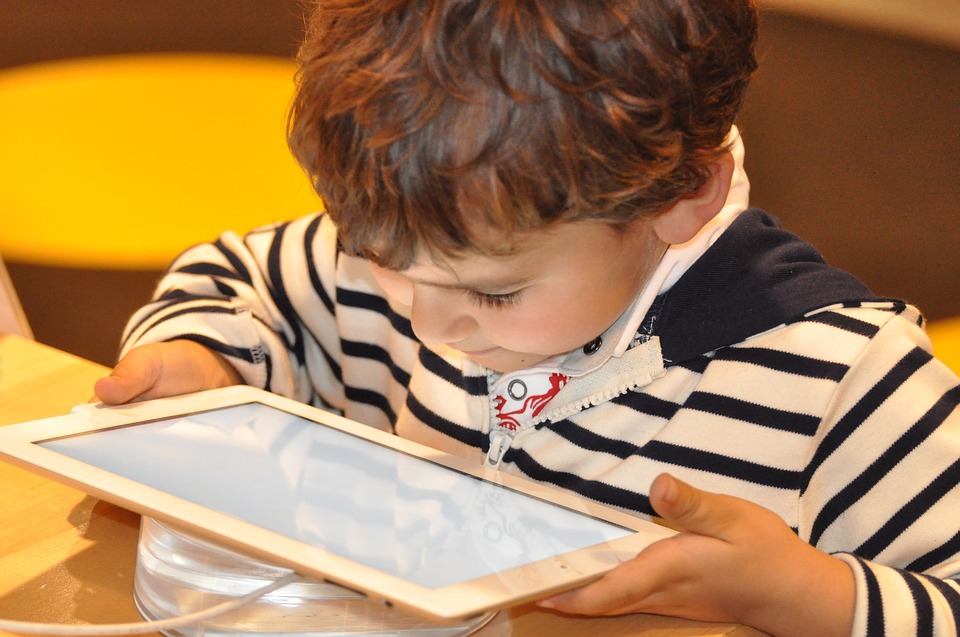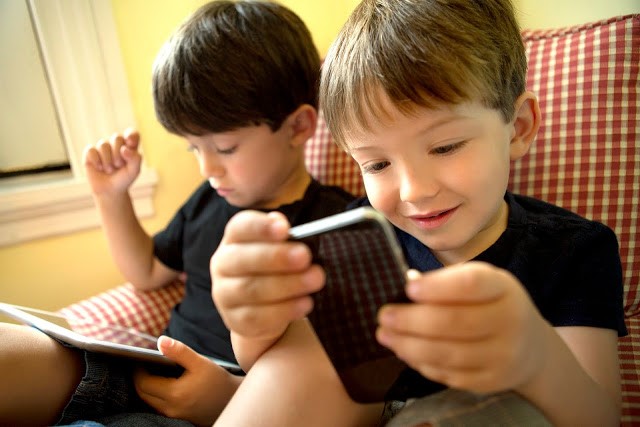
I was in a restaurant the other day with a young family seated next to me. The youngest boy was engrossed with a tablet. I wondered if that was a good thing or a bad thing. It was keeping him occupied and quiet. But he was not part of the family activity.
Yet I remember taking my acting-out 2-year-old grandson outside a restaurant as we waited for the food to come and walking up and down the sidewalk to the parking lot, talking about cars and trucks. Was one better than another?
My children use tablets to show movies to my grandkids on long car rides.

It keeps them from fighting, from complaining. It keeps them entertained. We do the same thing ourselves on long airplane rides. But there are no family alphabet games, or finding different states on license plates, or car singing or conversation, no marveling at the scenery. There is also no bickering, no poking, no “he’s breathing on me”, no “Are we there yet?” I remember a car trip to Yellowstone where two nephews spent the whole trip reading comic books, ignoring the scenery until forced to get out and look. Is one better than another? What is the effect of smartphones and tablets on young children?
A team of researchers at University of Iowa found that 90 percent of two-year-olds today have a moderate ability to use a tablet. Even a baby is delighted to find that when she swipes her mother’s phone, something happens. She wants to do it again.

This is not a problem I faced when I was raising children. I worry about extended time today’s children spend on handheld devices, but I don’t know if that worry is valid, or just the natural wariness of something new. Many parents happily hand their toddler the tablet, while others are so concerned about the perils of this technology that they leave the room to use their own phone or tablet. I don’t know what the answer is, so I did some research. Turns out the experts aren’t sure either.
Researchers at Boston University School of Medicine did a review of interactive media. They concluded that no one has a true scientific understanding of the effect on a generation raised on portable screens. Children are using them at a much faster rate than they can be studied. “At this time there are more questions than answers when it comes to mobile media,” said Radesky, clinical instructor in developmental-behavioral pediatrics at Boston University School of Medicine and who published the research.1
Our difficulty is that the dangers of tablet or smartphone use for children, if there are any, aren’t yet identified. We just don’t know what is going on in a child’s head, what might be rewired, what is good and what is bad while they are using mobile devices.

But that doesn’t stop us from guessing, hypothesizing, inferring, and looking at how children learn and extrapolating to a new situation. So let’s look at some pros and cons.
Cons:
1. Very young children learn best by interacting with parents, siblings and other kids. Dan Siegel of Mindful Awareness Research Center thinks lack of interaction caused by screen time may impede language, social and emotional development, impeding development of insights, empathy, connection, and self-knowledge.2 A 2014 study by UCLA’s Children’s Digital Media Center says kid’s social skills may be negatively affected. The visual and audio stimulation of tablets and smartphones lack the real-time social interaction and feedback that helps develop problem-solving skills and the understanding of the emotions of others that are typically learned during unstructured play and communication with peers. We know that social and emotional skills are critical to success in life.2
2. One thing that is well documented is that toddlers learn better from real world experiences—things they can touch—than from equivalent two-dimensional representations on the screen. You know that annoying habit of toddlers of kicking down a tower their older brother built? Turns out it is a necessary part of brain building. A block or Lego app isn’t a replacement for building something, knocking it down, and building it again.

“Preschool children need to interact with actual physical objects to develop their parietal cortex, which controls visual-spatial processing and helps develop math and science skills in later life. Radesky said “These devices may replace the hands-on activities important for the development of sensor-motor and visual-motor skills, which are important for the learning and application of maths and science.”1 To address this, some app developers are introducing companion toys that can be manipulated by little hands alongside the apps.”3
3. Studies suggest that when parents read ebooks to preschool children, they had lower reading comprehension than when the parents read physical books. The interactive additions such as animations, sounds, and tap and swipe features distract them from focusing on the story and lessen the potential benefit. Low-achieving and low-income school kids are more vulnerable to screen distractions, according to a University of Texas study.2
4. “One of the wonderful things with this technology is that there’s always something new you can do—it’s almost infinite,” says Dr. Gary Small.2 That’s why modern mobile technology is so compelling. Let’s face it. We’ve all sat down to scan our Facebook or Pinterest or Instagram for a few minutes and found ourselves still there an hour later. It’s designed to be that way. The whole clever industry, with a deep understanding of how the human mind works, make it their business to make sure we keep engaging in their app. And if we have a hard time regulating ourselves, our kids are even more affected. They do not learn moderation, impulse-control, and self-regulation. Doctors are concerned that over-exposure to screen has an impact on attention span, concentration, and surprisingly, appetite control. In other words, self-control.
5. “It seems that use of these devices in the evening before bedtime really has this negative impact on our sleep and on [our] circadian rhythms,” said Anne-Marie Chang, a neuroscientist.4

Children who sleep near a “small screen” average 20.6 fewer minutes of sleep every night. It may be caused by the blue light emitted by the screens that depletes melatonin which regulates the circadian rhythm. Screen time before bed resets their body’s clock and makes it harder to go to sleep.2
6. And then there is just the fact that screen time replaces other activities. Toddlers need to be active physically, exploring their environment and building their bodies.

They should be playing outdoors, reading, engaging in hobbies, stretching their minds with creative activities, or using their imagination. They need to learn to be alone without stimulation, to sit patiently. A child who never learns how to be alone will always be lonely. According to Catherine Steiner-Adair, a Harvard-affiliated clinical psychologist, children “need time to daydream, deal with anxieties, process their thoughts and share them with parents, who can provide reassurance.”2
7. Some programs are bot-generated imitations of original content, and the auto-run features can take the child to some shocking places. My 6-year-old granddaughter was doing what she thought was a Minecraft app when her mother noticed the girl figure in the app was being held by two boy figures who were pulling her in opposite directions. “Whoa, what are you watching?” Mom asked. She saw that the upcoming feature had a caged and wounded girl figure. It was quickly turned off and my daughter decided that auto-run was not an option.
Before you hide your tablet in the sand, some studies and experts are questioning the popular belief that young children should not be allowed to use any touch-screen because of their benefits.
Pros:
1. Kids develop an aptitude for technology. We have all had the experience of our kids showing us how to do something on our phones that are smarter than we are. Technology will be a part of his school learning, and it is reasonable to let them explore it early on. They may even be curious about how it works and learn coding or electronic engineering.2 One general said, “The problem with today’s military is that we have digital weapons and analog generals.” The future is technological.
2. Tablets and smart phones offer an opportunity for your child to learn and stimulate his mind in a fun way. Educational apps can enhance learning.
3. Used in a quality way, screens can actually be used to promote children’s cognitive and social development. Quality means being involved in your child’s use of screen, watching and talking about what he is seeing or doing. They can become a focus for conversations between parents and children. A daughter recently told me she and her husband had just had a fun evening playing Mario Brothers with their two young children. You can curl up with your child in your lap to enjoy an eBook, or work on an interactive math worksheet together, or watch manners and hygiene videos together.

In other words, hand-held devices might not be all bad if they generate sharing time instead of replacing it.3
4. They are also tools for your child to communicate, such as Skyping or Facetiming with friends or loving relatives.
5. There’s no doubt about it, smart phones and tablets are great pacifiers, especially on long trips or in restaurants. Because many apps are stimulus-driven with exciting audio-visual rewards for completing game levels or tasks, they trigger the reward pathway in the brain. This keeps the children engaged.2
6. For school age children, these devices can give them an additional learning layer. “Smartphones and tablets provide students with multiple opportunities to access content and engage with curriculum,” Galindo says. “They connect students to the world beyond the four walls of [school] and give them access to real world experts solving real world problems in real time. Technology makes their learning relevant.”

Especially now, with covid restricting actual trips, there are many opportunities for “visiting” other countries, national parks, museums, art galleries, attending presentations and webinars. I attended a fascinating presentation on the monarch butterfly aimed at children.
One thing the experts agree on is that we should be especially wary of giving interactive screens to children under 2 ½.

The brain development from age 0 to 2 ½ is critical to the development of executive function skills. During this time the infant’s brain triples in size. “A parent’s voice, touch, and play can help build pathways in their brain that aid them in learning how to bond emotionally with other people.” Too much screen time causes changes in their neural pathways and different ones are created says pediatric nurse Denise Daniels. It affects concentration, self-esteem, and personal relationships.4
1. These months develop the capacity to determine what to ignore and what to focus on around them.
2. “Studies have shown that when dealing with visual-spatial problems such as finding hidden objects or solving puzzles, toddlers perform better and learn more easily when a problem is presented in real life rather than on an interactive screen. This holds true even if apps have educational value.”2
3. “Researchers at Boston University School of Medicine found that use of interactive screen time under 30 months could …impair a child’s development of the skills needed for maths and science.”1 Researchers from the Univ. of Toronto found that every 30 minutes of screen time increased the risk of delayed speech by 49 %. A recent study by the University College London found screen time is linked to less sleep in infants. Sleep is important for the development of the brain.5
So what should a mother do? Here are some guidelines:
· Be involved with your child while they are using an interactive screen. Be aware of what they are watching and playing. Talk about what they are doing, what is happening on-screen, what its message is, what they are learning, and whether it is realistic or imaginative. Brain and language development happen when you talk with them about what they are doing. All of us learn best when we are actively involved with the material.

· Create rules about tablet and smartphone use, and follow them. Rules include time limits (the AAp suggests entertainment screen time be limited to 2 hours a day for children ages 3 to 18.)2, where the electronic device can be used (in family areas and out of bedrooms so it can be monitored), content, conditions (for instance: one hour of reading or playing sports in exchange for one hour of screen time), when (for instance: one hour on school days or three hours on weekends), etc.
· Use the built-in parental controls to keep them safe. Choose media geared toward children. Be aware that the first YouTube they watch may be innocent, but three or four later it may become offensive. Supervise the content. “What children watch and play matters,” says Jaynes.6
· Use moderation and balance. Make sure there is time for outdoor play, social interactions, physical learning, and conversations.
· But no one expects you to interact with your child 24/7. Sometimes you just need to take a shower, or finish cooking dinner, or take a mental health break so you don’t boil your children in oil.

If that is the case, electronic entertainment can provide the break that moms probably highly need and we shouldn’t feel guilty about it. I had a grandson undergoing chemo. Minecraft was a lifesaver for him, giving him something to do, goals to achieve, relief from pain and boredom.
However, probably more influential than our children’s use of hand held electronics is the example we set for them in our own use. Screen content is designed to suck you in, and digital products and social media are there to promote maximum engagement.2 If we are using our smartphones to the extent that we are the ones disrupting and interrupting the interaction with our children, the impact can be large.

If we are looking at our email or social media while our kids are begging for our attention, it has a clear and direct impact on a child’s language skill development. “Studies have shown that mothers who use tablets or smartphones while interacting with their child start 20% fewer verbal and 39% fewer nonverbal interactions with their children.” 2 We need to be the models for our children in striking a balance and interacting with our children.
Until we know more, parents can only follow their own parenting instincts. Be alert and watch the effects of screen time on your own children. One daughter said when she was ill with her second pregnancy, she often gave her 18-month daughter a tablet to keep her busy. She thought it was okay because she only provided her daughter with educational apps. But she observed when her child had been using the tablet for a long time, she became whinny and unsatisfied and miserable. Now (several years later), tablet watching is limited to 30 minutes, and only after chores, schoolwork, and interspersed with physical playtime. That is what seems to work best with her family.
Ponder, pray, observe, regulate, choose apps wisely, and good luck! May your children grow up intelligent, socially adept, and happy.
1. https://www.theguardian.com/technology/2015/feb/01/toddler-brains-research-smartphones-damage-social- development Tablets and smartphones may affect social and emotional development, scientists speculate, by Joanna Walters, The Guardian
SmartpSmartphone and Tablet Screen Time: Good or Bad for Kids?
3. https://goodmenproject.com/parenting/impact-tablets-cognitive-development-speech-delays-children-cmtt/ The Good Men Project, October 26, 2017 by Carol Miller
4. https://www.littlethings.com/reasons-not-to-give-children-technology/ by Elyse Wanshel
5. HTTPS://WWW.TELEGRAPH.CO.UK/SCIENCE/2017/05/04/TABLETS-SMARTPHONES-DAMAGE-TODDLERS-SPEECH-DEVELOPMENT/ THE TELEGRAPH
6. http://www.pbs.org/parents/childrenandmedia/article-when-introduce-child-smartphone-tablet.html Children and Media: When to Introduce Your Child to a Smartphone or Tablet, by Laura Lewis Brown
